Eastern Slavic naming customs
Eastern Slavic naming customs are the traditional way of identifying a person's given name and patronymic name in countries formerly part of the Russian Empire or the Soviet Union.
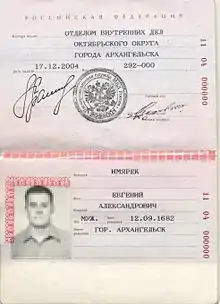
They are commonly used in Russia, Belarus, Ukraine, Kazakhstan, Turkmenistan, Uzbekistan and to an extent in Kyrgyzstan and Georgia. It is named after the East Slavic language group that the Russian language belongs to. They are also found occasionally in the Balkans among older generations.
| Name | Example (Cyrillic alphabet) | Example (Anglicised form) |
|---|---|---|
| First name (given name) | Владимир | Vladimir |
| Patronymic | Антонович | Antonovich |
| Family name (surname) | Иванов | Ivanov |
Given names
Eastern Slavic parents select a given name for a newborn child. Most first names in East Slavic languages originate from two sources:
Almost all first names are single. Doubled first names (as in, for example, French, like Jean-Luc) are very rare and from foreign influence. Most doubled first names are written with a hyphen: Mariya-Tereza.
Males
| Russian variant | Ukrainian variant | Belarusian variant | Latin-alphabet transliteration[note 1] (Russian / Ukrainian / Belarusian) | Origin | Comments |
|---|---|---|---|---|---|
| Иван | Іван | Іван, Ян | Ivan / Ivan / Jan | Hebrew | equivalent to John |
| Илья | Ілля | Ілля | Ilya / Illia / Illia | Hebrew | equivalent to Elijah |
| Николай | Микола | Мікалай, Мікола | Nikolai / Mykola / Mikalaj, Mikola | Greek | equivalent to Nicholas, meaning "Victory (of the) People" |
| Борис | Борис | Барыс | Boris / Borys / Barys | Slavonic | "fighter" |
| Владимир | Володимир | Уладзімір | Vladimir / Volodymyr / Uladzimir | Slavonic | meaning "great/famous lord" (-мир comes from мѣръ and is not related to міръ or миръ, see also the name's etymology) |
| Пётр | Петро | Пётр, Пятро, Пятрусь | Pyotr / Petro / Piotr, Piatro, Piatruś | Greek | equivalent to Peter |
| Андрей | Андрій | Андрэй | Andrei / Andrii / Andrej | Greek | equivalent to Andrew |
| Александр | Олександр, Олекса | Аляксандр | Aleksandr / Oleksandr, Oleksa / Aliaksandr | Greek | equivalent to Alexander |
| Филипп | Пилип | Піліп | Filip / Pylyp / Pilip | Greek | from Greek Φίλιππος (Philippos), meaning "fond of horses". |
| Дмитрий | Дмитро | Дзмітры, Зміцер | Dmitrij / Dmytro / Dzmitry, Zmicier | Greek | from Greek Δημήτριος (Demetrios), meaning "of Demeter" |
| Сергей | Сергій | Сяргей | Sergei / Serhij / Siarhiej | Latin | from the Roman nomen (patrician family name) Sergius, itself from a more ancient Etruscan name |
| Леонид | Леонід | Леанід, Лявон | Leonid / Leonid / Lieanid, Liavon | Greek | from Greek Leonidas, meaning "Son of the Lion" |
| Виктор | Віктор | Віктар | Viktor / Viktor / Viktar | Latin | meaning "Conqueror" |
| Георгий | Георгiй | Георгій | Georgi / Heorhij / Hieorhij | Greek | the analogues are Егор (Yegor), Юрий (Yury), equivalent to George |
| Павел | Павло | Павел, Павал, Паўло | Pavel / Pavlo / Paval, Paŭlo | Latin | equivalent to Paul |
| Константин | Костянтин | Канстанцін, Кастусь | Konstantin / Kostiantyn / Kanstancin, Kastuś | Latin | equivalent to Constantine |
| Кирилл | Кирило | Кірыл, Кірыла | Kirill / Kyrylo / Kiryl, Kiryla | Greek | equivalent to Cyril |
| Василий | Василь | Васіль, Базыль | Vasili / Vasyl' / Vasiĺ, Bazyĺ | Greek | equivalent to Ваsіl |
| Роман | Роман | Раман | Roman / Roman / Raman | Latin | - |
| Владислав | Владислав | Уладзіслаў | Vladislav / Vladyslav / Uladzislaŭ | Slavonic | meaning "Lord of Fame" |
| Вячеслав | В'ячеслав | Вячаслаў | Vyacheslav / Viacheslav / Viačaslaŭ | Slavonic | meaning "Growing Fame" |
| Матвей | Матвій | Матвей, Мацвей | Matvei / Matvij / Matviej, Macviej | Hebrew | equivalent to Matthew |
| Михаил | Михайло | Міхал, Міхась | Mikhail / Mychailo / Michal, Michaś | Hebrew | equivalent to Michael |
| Олег | Олег | Алег | Oleg / Oleh / Alieh | Old Norse | derivative from Scandinavian "Helgi" |
| Игорь | Ігор | Ігар | Igor / Ihor / Ihar | Old Norse | derivative from Scandinavian "Ingvar" |
| Максим | Максим | Максім | Maksim / Maksym / Maksim | Latin | meaning "Greatest" |
- The same romanization system is used for all three languages for comparative purposes. For the official romanization systems Of Russian, Ukrainian, and Belarusian, which will be used throughout the rest of the article, see romanization of Russian, romanization of Ukrainian, and romanization of Belarusian, respectively.
Females
| Russian variant | Ukrainian variant | Belarusian variant | Latin-alphabet transliteration (Russian / Ukrainian / Belarusian) | Origin | Comments |
|---|---|---|---|---|---|
| Анастасия | Анастасія | Настасся, Наста | Anastasiya / Anastasija / Nastassia, Nasta | Greek | from Greek Ἀναστασία (Anastasia) meaning "she of the Resurrection" |
| Ангелина | Ангеліна | Ангеліна | Angelina / Anhelina / Angielina | Greek | From Greek Ἀγγελίνα (Angelina) meaning "messenger" |
| Áнна | Анна, Ганна | Ганна | Anna / Anna, Hanna / Hanna | Hebrew | equivalent to Anne or Hannah |
| Елена, Алёна | Oленa | Алена | Yelena, Aliona / Olena / Aliena | Greek | equivalent to Helen; in Russian Alyona can be both a pet version of Yelena and a name in its own right |
| Мария | Марія | Марыя | Mariya / Marija / Maryja | Hebrew | equivalent to Mary |
| Наталья, Наталия | Наталя, Наталія | Наталля | Natalya / Nataliya, Natalija / Natalia, Natalija / Natallia | Latin | equivalent to Natalie |
| Ольга | Ольга | Вольга | Olga / Ol'ha / Voĺha | Old Norse | derivative from Scandinavian Helga |
| Александра | Олександра | Аляксандра | Aleksandra / Oleksandra / Aliaksandra | Greek | equivalent to Alexandra |
| Ксения, Оксана | Оксана | Ксенія, Аксана | Kseniya, Oksana / Oksana / Ksienija, Aksana | Greek | in Russian, Oksana is a separate name of the same origin |
| Екатерина | Катерина | Кацярына | Yekaterina / Kateryna / Kaciaryna | Greek | equivalent to Catherine |
| Елизавета | Єлизавета | Лізавета | Yelizaveta / Yelyzaveta / Lizavieta | Hebrew | equivalent to Elizabeth |
| Татьяна | Тетяна | Тацяна, Таццяна | Tatyana / Tetiana / Taciana, Tacciana | Latin | derivative from the Latinized name of the Sabine king Titus Tatius |
| Людмила | Людмила | Людміла | Lyudmila / Liudmyla / Liudmila | Slavonic | meaning "Dear to the People" |
| Светлана | Світлана | Святлана | Svetlana / Svitlana / Sviatlana | Slavonic | meaning "The Shining One" |
| Юлия | Юлія | Юлія | Yuliya / Julija / Julija | Latin | equivalent to Julia or Julie |
| Вера | Віра | Вера | Vera / Vira / Viera | Slavonic | meaning "Faith"; a calque of the Greek Πίστη |
| Надежда | Надія | Надзея | Nadezhda / Nadiia / Nadzieja | Slavonic | meaning "Hope"; a calque of the Greek Ἐλπίς |
| Любовь | Любов | Любоў | Lyubov' / Liubоv / Liuboŭ | Slavonic | meaning "Love"; a calque of the Greek Ἀγάπη |
| София, Софья | Софія | Соф'я | Sofiya, Sofya / Sofija / Sofja | Greek | equivalent to Sophia, meaning "Wisdom". |
Forms
Being highly synthetic languages, Eastern Slavic treats personal names as grammatical nouns and apply the same rules of inflection and derivation to them as for other nouns. So one can create many forms with different degrees of affection and familiarity by adding the corresponding suffixes to the auxiliary stem derived from the original name. The auxiliary stem may be identical to the word stem of the full name (the full name Жанна Zhanna can have the suffixes added directly to the stem Жанн- Zhann- like Жанночка Zhannochka), and most names have the auxiliary stem derived unproductively (the Russian name Михаил Mikhail has the auxiliary stem Миш- Mish-, which produces such name-forms as Миша Misha, Мишенька Mishenka, Мишуня Mishunya etc., not *Михаилушка Mikhailushka).
Unlike English, in which the use of diminutive forms is optional even between close friends, in East Slavonic languages such forms are obligatory in certain contexts because of the strong T–V distinction: the T-form of address usually requires the short form of the counterpart's name. Also, unlike other languages with prominent use of name suffixes, such as Japanese, the use of derived name forms is mostly limited to the T-addressing: there is no way to make the name more formal than the plain unsuffixed full form, and no suffixes can be added to the family name.
Most commonly, Russian philologists distinguish the following forms of given names:
| Name form | Example | Formation | Comments |
|---|---|---|---|
| Full | Анна (Anna) | full name stem + case ending | - |
| Short | Аня (Anya) | short name stem + II declension ending | most common for informal communication, comparable to Western name-only form of address (Ann, John), or Japanese surname-only, or surname/name -kun |
| Diminutive | Анька (Anka) | short name stem + -к- -k- + II declension ending | expresses familiarity, may be considered rude when used between people who are not close friends. Comparable to English diminutives (Annie, Willy) or Japanese unsuffixed names |
| Affective diminutive | Анечка (Anyechka) | short name stem + -ечк/очк/оньк/усь/юсь/уль/юль- -echk/ochk/on'k/us/yus/ul/yul- + II declension ending | most intimate and affectionate form, comparable to German diminutives (Ännchen) or Japanese -chan suffixes |
Short forms
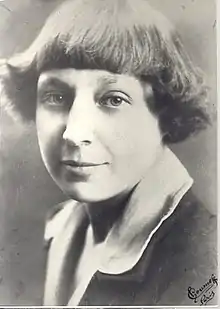
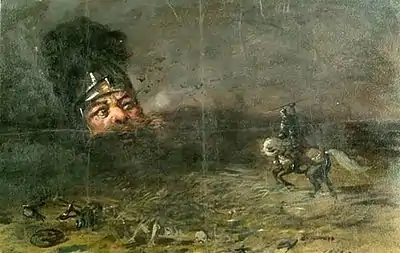
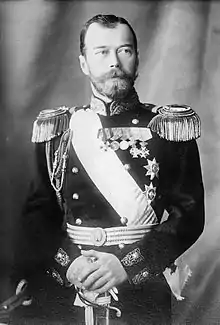
The "short name" (Russian: краткое имя kratkoye imya), historically also "half-name" (Russian: полуимя poluimya), is the simplest and most common name derivative. Bearing no suffix, it is produced suppletively and always has the declension noun ending for both males and females, thus making short forms of certain unisex names indistinguishable: for example, Sasha (Russian: Саша) is the short name for both the masculine name Aleksandr (Alexander) and the feminine form Aleksandra (Alexandra).
Some names, such as Zhanna (Jeana) and Mark have no short forms, and others may have two (or more) different forms. In the latter case, one form is usually more informal than the other.
| Full name (Cyrillic script) | Full name (Latin script) | Short forms (Cyrillic) | Short forms (Latin) |
|---|---|---|---|
| Александр | Aleksandr (m) | Саша, Саня, Шура, ukr. Сашко, Лесь | Sasha, Sanya, Shura, ukr. Sashko, Les |
| Александра | Aleksandra (f) | Саша, Шура, ukr. Леся | Sasha, Shura, ukr. Lesia |
| Алексей | Aleksey (m) | Алёша, Лёша | Alyosha, Lyosha |
| Анастасия | Anastasia (f) | Настя, Стася | Nastya, Stasya (rare) |
| Анатолий | Anatoly (m) | Толя | Tolya |
| Анна | Anna (f) | Аня, Анюта, Нюта, Нюша | Anya, Anyuta, Nyuta, Nyusha |
| Борис | Boris (m) | Боря | Borya |
| Дарья | Darya (f) | Даша | Dasha |
| Дмитрий | Dmitry (m) | Дима, Митя | Dima, Mitya |
| Галина | Galina (f) | Галя | Galya |
| Геннадий | Gennady (m) | Гена | Gena |
| Георгий | Georgy (m) | Гоша, Жора | Gosha, Zhora |
| Григорий | Grigory (m) | Гриша, Гриць | Grisha, Gritz (ukr.) |
| Евгений, Евгения | Yevgeniy (m), Yevgenia (f) | Женя | Zhenya |
| Иван | Ivan (m) | Ваня | Vanya |
| Ирина | Irina (f) | Ира | Ira |
| Константин | Konstantin (m) | Костя | Kostya |
| Ксения | Ksenya (f) | Ксюша | Ksyusha |
| Лариса | Larisa (f) | Лара, Лёля | Lara, Lyolya (rare) |
| Леонид | Leonid (m) | Лёня | Lyonya |
| Лев | Lev (m) | Лёва | Lyova |
| Лидия | Lidiya (f) | Лида | Lida |
| Любовь | Lyubov' (f) | Люба | Lyuba |
| Людмила | Lyudmila (f) | Люда, Люся, Мила | Lyuda, Lyusya, Meela (rare) |
| Мария | Mariya (f) | Маша, Марічка | Masha, Marichka (ukr.) |
| Михаил | Mihail (m) | Миша | Misha |
| Надежда | Nadezhda (f) | Надя | Nadya |
| Наталья | Natalya (f) | Наташа | Natasha |
| Николай | Nikolay (m) | Коля | Kolya |
| Ольга | Olga (f) | Оля | Olya |
| Павел | Pavel (m) | Паша, Павлик | Pasha, Pavlik |
| Полина | Polina (f) | Поля, Лина | Polya, Lina (rare) |
| Пётр | Pyotr (m) | Петя | Petya |
| Роман | Roman (m) | Рома | Roma |
| Сергей | Sergey (m) | Серёжа | Seryozha |
| София | Sofia, Sofya (f) | Соня, Софа | Sonya, Sofa |
| Светлана | Svetlana (f) | Света, Лана | Sveta, Lana |
| Станислав | Stanislav (m) | Стас | Stas, Stanko |
| Тамара | Tamara (f) | Тома | Toma |
| Татьяна | Tatyana (f) | Таня | Tanya |
| Вадим | Vadim (m) | Вадик, Дима | Vadik, Dima (rare) |
| Валентин / Валентина | Valentin (m) / Valentina (f) | Валя | Valya |
| Валерий | Valery (m) | Валера | Valera |
| Валерия | Valeriya (f) | Лера | Lera |
| Василий | Vasily (m) | Вася | Vasya |
| Виктор | Viktor (m) | Витя | Vitya |
| Виктория | Viktoriya (f) | Вика | Vika |
| Владимир | Vladimir (m) | Вова, Володя | Vova, Volodya |
| Владислав, Владислава | Vladislav (m), Vladislava (f) | Влад, Влада | Vlad, Vlada |
| Вячеслав | Vyacheslav (m) | Слава | Slava |
| Ярослав | Yaroslav (m) | Ярик | Yarik |
| Елена | Yelena (f) | Лена, Алёна | Lena, Alyona |
| Елизавета | Yelizaveta (f) | Лиза | Liza |
| Екатерина | Yekaterina (f) | Катя | Katya |
| Евгений / Евгения | Yevgeniy (m) / Yevgeniya (f) | Женя | Zhenya |
| Юлия | Yuliya (f) | Юля | Yulya |
| Юрий | Yury (m) | Юра | Yura |
Diminutive forms
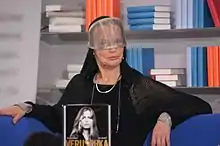
Diminutive forms are produced from the "short name" by means of various suffixes; for example, Михаил Mikhail (full) — Миша Misha (short) — Мишенька Mishenka (affectionate) — Мишка Mishka (colloquial). If no "short name" exists, then diminutive forms are produced from the full form of the respective first name; for example, Марина Marina (full) — Мариночка Marinochka (affectionate) — Маринка Marinka (colloquial). Unlike the full name, a diminutive name carries a particular emotional attitude and may be unacceptable in certain contexts. Depending on the nature of the attitude, diminutive nameforms can be subdivided in three broad groups: affectionate, familiar and slang.
Affectionate diminutive
Typically formed by suffixes -еньк- (-yenk-), -оньк- (-onk-), -ечк- (-yechk-), -ушк (-ushk), as illustrated by the examples below. It generally emphasises a tender, affectionate attitude and is roughly analogous to German suffixes -chen, -lein, Japanese -chan and -tan and affectionate name-derived nicknames in other languages. It is often used to address children or intimate friends.
Within a more official context, this form may be combined with the honorific plural to address a younger female colleague.
| Full form | Short form | Diminutive form |
|---|---|---|
| (Cyrillic/Latin) | ||
| Анна/Anna | Аня/Anya | Анечка/Anyechka |
| Виктор/Viktor | Витя/Vitya | Витенька/Vitenʲka |
| Дмитрий/Dmitry | Дима/Dima | Димочка/Dimochka |
| Ольга/Olga | Оля/Olya | Оленька/Olyenka |
| Степан/Stepan | Стёпа/Styopa | Стёпочка/Styopochka |
Colloquial diminutives
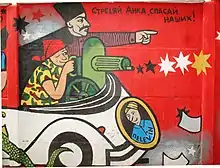
Colloquial diminutives are derived from short names by the -к- ("-k-") suffix. Expressing a highly familiar attitude, the use may be considered rude or even pejorative outside a friendly context.
| Full form | Short form | Colloquial diminutive form | |||
|---|---|---|---|---|---|
| (Cyrillic) | (Latin) | (Cyrillic) | (Latin) | (Cyrillic) | (Latin) |
| Анна | Anna | Аня | Anya | Анька | Anʲka |
| Виктор | Viktor | Витя | Vitya | Витька | Vitʲka |
| Дмитрий | Dmitry | Дима | Dima | Димка | Dimka |
| Ольга | Olga | Оля | Olya | Олька | Olʲka |
| Степан | Stepan | Стёпа | Styopa | Стёпка | Styopka |
Slang forms
Slang forms exist for male names and, since a few decades ago, female names. They are formed with the suffixes -ян (-yan), -он (-on), and -ок/ёк (-ok/yok). The suffixes give the sense of "male brotherhood" that was once expressed by the patronymic-only form of address in the Soviet Union. Originating in criminal communities, such forms came into wide usage in Russia in the 1990s.
| Full form | Short form | Slang form | |||
|---|---|---|---|---|---|
| (Cyrillic) | (Latin) | (Cyrillic) | (Latin) | (Cyrillic) | (Latin) |
| Анатолий | Anatoly | Толя | Tolya | Толян | Tolyan |
| Николай | Nikolay | Коля | Kolya | Колян | Kolyan |
| Дмитрий | Dmitry | Дима | Dima | Димон | Dimon |
| Владимир | Vladimir | Вова | Vova | Вован | Vovan |
| Александр | Alexander | Саша | Sasha | Санёк | Sanyok |
| Татьяна | Tatiana | Таня | Tanya | Танюха | Tanyukha |
Early Soviet Union
During the days of the October Revolution, as part of the campaign to rid Russia of bourgeois culture, there was a drive to invent new, revolutionary names. As a result, many Soviet children were given unusual or atypical names, often being acronyms/initialisms besides many other names above.
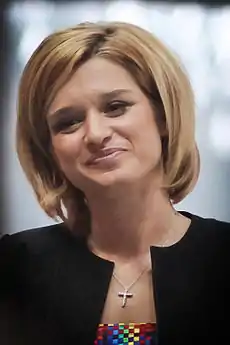
| Name (Cyrillic) | Name (Latin) | Origin | Comments |
|---|---|---|---|
| Вил, Вилен, Владлен, Владлена | Vil, Vilen, Vladlen (m) / Vladlene (f) | Владимир Ильич Ленин (Vladimir Ilyich Lenin) | - |
| Мэл(c) | Mel(s) | Маркс, Энгельс, Ленин (и Сталин) (Marx, Engels, Lenin (and Stalin)) | - |
| Баррикада | Barrikada | - | "Barricade" - refers to the revolutionary activity |
| Ревмир, Ревмира | Revmir (m) / Revmira (f) | Революция мира (Revolyutsiya mira) | Means "The World Revolution" |
| Гертруда | Gertruda | Герой труда (Geroy truda) | Means "The Hero of Labour" |
| Марлен | Marlen | Маркс и Ленин (Marx and Lenin) | - |
| Стэн | Sten | Сталин и Энгельс (Stalin and Engels) | - |
| Ким | Kim | Коммунистический интернационал молодёжи (Kommunistichesky Internatsional Molodyozhi) | Means "Young Communist International" |
Patronymics
The patronymic name is based on the first name of the father and is written in all legal and identity documents. If used with the first name, the patronymic always follows it.
Usage
Patronymic name is obligatory when addressing a person of higher social stance and/or on special occasions such as business meetings; for example, when pupil addresses a teacher, he is obliged to use both first and patronymic names – Russian: Марья Ивановна, могу я спросить..., lit. 'Marya Ivanovna, may I ask...'. Not using patronymic names in such situations is considered offensive.[1]
Addressing a person by patronymic name only is widespread among older generations (more often – "blue collar"-male coworkers) and serves as a display of close relationship based on not only sympathy but also mutual responsibility.[2]
Derivation
| Name | Masculine patronym | Feminine patronym |
|---|---|---|
| Anatoly | Anatolyevich | Anatolyevna |
| Constantin | Constantinovich | Constantinovna |
| Dmitry | Dmitriyevich | Dmitriyevna |
| Ilya | Ilyich | Ilyinichna |
| Ivan | Ivanovich | Ivanovna |
| Nikolay | Nikolayevich | Nikolayevna |
| Vladimir | Vladimirovich | Vladimirovna |
| Yakov | Yakovlevich | Yakovlevna |
The patronymic is formed by a combination of the father's name and suffixes. The suffix is -ович (-ovich) for a son, -овна (-ovna) – for a daughter. For example, if the father's name was Иван (Ivan), the patronymic will be Иванович (Ivanovich) for a son and Ивановна (Ivanovna) for a daughter.
If the suffix is being appended to a name ending in a й ("y") or a soft consonant, the initial o in the suffixes -ович (-ovich) and -овна (-ovna) becomes a е ("ye") and the suffixes change to -евич (-yevich) and -евна (-yevna). For example, if the father is Дмитрий (Dmitry), the patronymic is Дмитриевич (Dmitrievich) for a son and Дмитриевна (Dmitrievna) for a daughter. It is not Дмитрович (Dmitrovich) or Дмитровна (Dmitrovna) because the name Дмитрий (Dmitry) ends on "й" ("y");
For some names ending in a vowel, the suffix is -ич (-ich) for a son and -ична (-ichna) or -инична (-inichna) for a daughter; for example, Фока Foka (father's first name) — Фокич Fokich (male patronymic) — Фокична Fokichna (female patronymic); Кузьма Kuzma (father's first name) — Кузьмич Kuzmich (male patronymic) — Кузьминична Kuzminichna (female patronymic).
Historical grounds
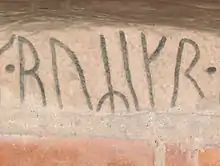
Historical Russian naming conventions did not include surnames. A person's name included that of his father: e.g. Иван Петров сын (Ivan Petrov syn) which means "Ivan, son of Peter". That is the origin of most Russian -ov surnames.
Modern -ovich- patronyms were originally a feature of the royal dynasty (Рюриковичи, Ruerikovichi, Rurikids), which makes the Russian patronym in its original meaning being similar to German von. From the 17th century, the second name with suffix -ович (-ovich) was the privilege given by tsar to commoners. For example, in 1610, Tsar Vasili IV gave to the Stroganovs, who were merchants, the privilege to use patronyms. As a tribute for developing the salt industry in Siberia, Pyotr Stroganov and all his issue were allowed to have a name with -ovich. The tsar wrote in the chart dated on May 29, "... to write him with ovich, to try [him] in Moscow only, not to fee [him] by other fees, not to kiss a cross by himself [which means not to swear during any processions]"[3] In the 18th century, it was the family of merchants to have patronyms. By the 19th century, the -ovich form eventually became the default form of a patronymic.
Legal basis
Everyone in Russia, Ukraine and Belarus is supposed to have a tripartite name. Single mothers may give their children any patronym and this does not have any legal consequences. Foreigners who adopt Russian citizenship are exempted from having a patronym. Now, an adult person is entitled to change patronyms if necessary[4] such as to alienate themselves from the biological father (or to show respect for the adopted one) as well as to decide the same for an underage child.
Family names
Family names are generally used like in English.
Derivation and meaning
In Russian, some common suffixes are -ов (-ov), -ев (-yev), meaning "belonging to" or "of the clan of/descendant of", e.g. Petrov = of the clan of/descendant of Petr (Peter), usually used for patronymic surnames or -ский (-sky), an adjectival form meaning "associated with" and usually used for toponymic surnames. Historically toponymic surnames may have been granted as a token of nobility, for example, the princely surname Shuysky is indicative of the princedom based on the ownership of Shuya. Prince Grigory Aleksandrovich Potemkin-Tavricheski, had the victory title 'Tavricheski' as part of his surname granted to him for the annexation of Crimea by the Russian Empire.
In the 19th and the early 20th centuries, -off was a common transliteration of -ov for Russian family names in foreign languages such as French and German (like for the Smirnoff and the Davidoff brands).
Surnames of Ukrainian and Belarusian origin use the suffixes -ко (-ko), -ук (-uk), and -ич (-ych). For example, the family name Писаренко (Pisarenko) is derived from the word for a scribe, and Ковальчук (Kovalchuk) refers to a smith.
Less often, some versions of family names will have no suffix, e.g. Lebed, meaning swan, and Zhuk, meaning beetle (but see also Lebedev and Zhukov).
Hyphenated surnames like Petrov-Vodkin are possible.
Grammar
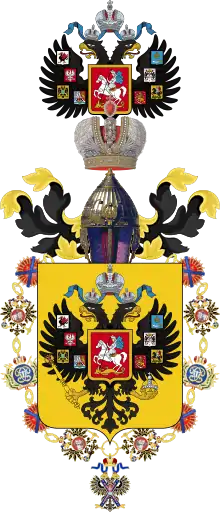
Eastern Slavic languages are synthetic languages and have grammatical cases and grammatical gender. Unlike analytic languages like English, which use prepositions ("to", "at", "on" etc.) to show the links and relations between words in a sentence, Eastern Slavic suffixes are used much more broadly than prepositions. Words need the help of some suffix to integrate them into the sentence and to build a grammatically-correct sentence. That includes names, unlike in German. Family names are declined based on the Slavic case system.
As with Slavic adjectives, family names have different forms depending on gender. For example, the wife of Борис Ельцин (Boris Yel'tsin) was Наина Ельцина (Naina Yel'tsina). Only family names with neutral grammatical gender stay the same (such as those ending with -енко (-yenko)).
That change of grammatical gender is not considered to be changing the name that comes from a woman's father or husband (compare the equivalent rule in Polish, for example). The correct transliteration of such feminine names in English is debated: the names technically should be in their original form, but they sometimes appear in the masculine form.
The example of Иванов (Ivanov), a family name, will be used:
| Grammatical case | Example of question | Masculine form | Feminine form | ||
|---|---|---|---|---|---|
| Cyrillic | Latin | Cyrillic | Latin | ||
| Nominative | Who? | Иванов | Ivanov | Иванова | Ivanova |
| Genitive | Whose? | Иванова | Ivanova | Ивановой | Ivanovoy |
| Dative | To whom? | Иванову | Ivanovu | Ивановой | Ivanovoy |
| Accusative | Whom? | Иванова | Ivanova | Иванову | Ivanovu |
| Instrumental | By whom? | Ивановым | Ivanovym | Ивановой | Ivanovoy |
| Locative (Prepositional) | About whom? | Иванове | Ivanove | Ивановой | Ivanovoy |
Family names are generally inherited from one's parents. As in English, on marriage, women usually adopt the family name of the husband, as in English; the opposite very rarely occurs. Rarely, both spouses keep their family name.
Anglicisation
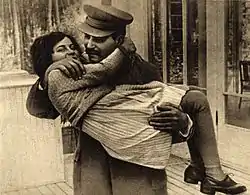
When names are written in English, the patronymic is not equivalent to an English middle name. When the name is written in English, the patronymic may be omitted with the given name written out in full or abbreviated (Vladimir Putin or V. Putin), both the first name and the patronymic may be written out in full (Vladimir Vladimirovich Putin), both the first name and the patronymic may be abbreviated (V. V. Putin) or the first name may be written out in full with the patronymic abbreviated (Vladimir V. Putin).
Slavicisation of foreign names
By law, foreign persons who adopt Russian citizenship are allowed to have no patronymic.[5] Some adopt non-Slavonic patronymics as well. For example, the Russian politician Irina Hakamada's patronym is Муцуовна (Mutsuovna) because her Japanese father's given name was Mutsuo. The ethnicity of origin generally remains recognisable in Russified names.
Bruno Pontecorvo, after he emigrated to the Soviet Union, was known as Бруно Максимович Понтекорво (Bruno Maximovich Pontekorvo) in the Russian scientific community, as his father's given name was Massimo (corresponding to Russian Максим (Maksim). His sons have been known by names Джиль Брунович Понтекорво (Gigl Brunovich Pontecorvo), Антонио Брунович Понтекорво (Antonio Brunovich Pontecorvo) and Тито Брунович Понтекорво (Tito Brunovich Pontekorvo).
Such conversion of foreign names is unofficial and often optional.
Some Turkic languages also use patronymics with the Turkic word meaning 'son' or 'daughter'. The languages were official in the countries in the Russian Empire and then the Soviet Union.
For example, Kazakh ұлы (uly; transcribed into Latin script as -uly, as in Nursultan Abishuly Nazarbayev), Turkmen uly (as in Gurbanguly Berdimuhamedow), or Azeri оглы/оғлу (oglu) (as in Heydar Alirza oglu Aliyev); Kazakh қызы (transcribed into Latin script as -qyzy, as in Dariga Nursultanqyzy Nazarbayeva). Such Turkic patronymics were officially allowed in the Soviet Union.
Some surnames in those languages have been Russified since the 19th century: the surname of Kazakh president Nursultan Nazarbayev has a Russian "-yev" suffix, which literally means "of Nazar-bay" (in which "bay" is a Turkic native noble rank: compare Turkish "bey", Uzbek "beg", and Kyrghyz "bek"). The frequency of such Russification varies greatly by country.
Some ethnic groups use more than one name: one official, another unofficial. Official names have Russian patronymics, and unofficial names are noble or tribal names, which were prohibited after the Russian Revolution. After the fall of the Soviet Union, some people returned to using these tribal or noble names as surnames (Sarah Naiman, a Kazakh singer, has a surname means that she is from Naimans). Some Muslim people changed their surnames to Arabic style (Tungyshbay Zhamankulov, a famous Kazakh actor who often plays role of khans in films, changed his name to Tungyshbay al-Tarazy).
Forms of address
Common rules
- The full three-name form (for instance, Иван Иванович Петров Ivan Ivanovich Petrov) is used mostly for official documents. Everyone in Russia, Ukraine and Belarus is supposed to have three names. This form is also used on some very formal occasions and for introducing oneself to a person who is likely to write down the full name, like a police officer. Then, the family name is often placed first (Петров Иван Иванович, Petrov Ivan Ivanovich).
- the form "first name + patronymic" (for instance, Иван Иванович, Ivan Ivanovich):
- is the feature of official communication (for instance, students in schools and universities call their teachers in the form of "first name + patronymic" only);
- may convey the speaker's respect for the recipient. Historically, patronymics were reserved for the royal dynasty (Рюриковичи, Ruerikovichi)
- The family name alone (Петров, Petrov) is used, much more rarely, in formal communications. It is commonly used by school teachers to address their students. Informally, Russians are starting to call people by their surnames alone for irony.
- For informal communication, only the first name is used: Иван Ivan. Even more informally, diminutives (several can be formed from one name) are often used.
- In rural areas, the patronymic name alone (Петрович Petrovich, Ивановна Ivanovna) is used by old people among themselves, but young people sometimes use the form for irony. Also, younger people can use the form for much older people for both respect and informality. For example, a much younger man with a very good relationship with his elder colleague may use a patronymic and the "ty" form, but using first name alone is generally inappropriate. Using a diminutive (like in most informal communication) would nearly always be very impolite.
The choice of addressing format is closely linked to the choice of second-person pronoun. Russian language distinguishes:
- informal ты (ty, "you", "thou" in old English);
- formal вы (vy, "you"); respectful Вы ("Vy", "You") may be capitalized, but plural вы ("vy", "you") is not.
Вы ("Vy") is the plural of both forms to address a pair or group. Historically, it comes from German, under Peter the Great, which uses "du and Sie" similarly.
Other than the use of patronymics, Russian forms of address in Russian are very similar to English ones.
Also, the meaning of form of address strongly depends on the choice of a V-T form:
| Vy or ty | Form | Male example | Female example | Use |
|---|---|---|---|---|
| Using "Vy" | Full three-name form | Anatoliy Pavlovich Ivanov | Varvara Mikhailovna Kuznetsova | Official documents, very formal occasions (when necessary) |
| First name + patronymic | Anatoliy Pavlovich | Varvara Mikhailovna | General formal or respectful form | |
| Surname | Ivanov | Kuznetsova | Formal. Often used by a person of a higher social position (like a teacher talking to a student) | |
| Informal first name + informal patronymic | Tol' Palych | Varvara Mikhalna | Respectful but less formal | |
| Full first name | Anatoliy | Varvara | ||
| Diminutive first name | Tolya | Varya | Friendly but still somewhat formal | |
| Affectionate first name | Varechka | Used almost exclusively towards women, showing fondness but still keeping some formality (like to a younger colleague) | ||
| Using "Ty" | First name + patronymic | Anatoliy Pavlovich | Varvara Mikhailovna | Can be used between friends on semi-formal occasions or ironically |
| Informal patronymic | Palych | Mikhalna | Combining familiarity and respect | |
| Surname | Ivanov | Kuznetsova | Similar in use to a "vy" form but less formal | |
| Full first name | Anatoliy | Varvara | Friendly but with a tone of formality. If the name has no diminutive form (Yegor), also used informally | |
| Diminutive first name | Tolia | Varya | General informal form | |
| Colloquial first name | Tolik | Var'ka | Very familiar form | |
| Slang first name | Tolyan | Varyukha | ||
| Affectionate first name | Tolen'ka | Varechka | Tender, affectionate form |
Using a "ty" form with a person who dislikes it or on inappropriate occasions can be an insult, especially the surname alone.
Adjectives
Other Eastern Slavic languages use the same adjectives of their literal translation if they differ from Russian analogue. All Eastern Slavic languages are synthetic languages and grammatical genders are used. Thus, the suffix of an adjective changes with the sex of the recipient.
In Russian, adjectives before names are generally restricted to written forms of communication. Adjectives like Любимый / Любимая (lyubimiy / lyubimaya, "beloved") and Милый / Милая (miliy / milaya, "sweetheart") are informal, and Уважаемый / Уважаемая (uvazhayemiy / uvazhayemaya, literally "respected") is highly formal. Some adjectives, like Дорогой / Дорогая (dorogoy / dorogaya, "dear"), can be used in both formal and informal letters.
See also
References
- Citations
- "Как обращаться к человеку в русскоязычной среде" [How to address a person in Russian-speaking community] (in Russian). Retrieved 24 September 2020.
- "Система обращений и речевой этикет" [System of addressing and speech etiquette] (in Russian). "СЕКРЕТАРСКОЕ ДЕЛО" № 02/2016. Retrieved 24 September 2020.
- писать его с вичем, судить только в Москве, излишних пошлин с товаров не брать, креста самому не целовать (in Russian). Собр. Гос. Грам. II, № 196.
- Federal Law of the Russian Federation on Acts of Civil Statements, Clauses: 58, 59.
- Family Code of the Russian Federation, Article 58.2 "A child's patronym is formed from the father's [first] name unless otherwise [decreed by] national custom".
External links
- In Russian
- Балановская Е. В., Соловьева Д. С., Балановский О. П. и др. «Фамильные портреты» пяти русских регионов / Медицинская генетика. 2005.No. 1. С. 2–10.
- Таблицы и рисунки к статье «Фамильные портреты» пяти русских регионов
- Подробный популярный пересказ Report in the journal «Химия и жизнь»
- Article in «Коммерсантъ ВЛАСТЬ» No. 38 от 26 сентября 2005 г. и реакция на нее авторов работы.
- Article in «Коммерсантъ ВЛАСТЬ»"Лицо русской национальности". 38 (641) (Власть ed.). 2005: 54–60. Cite journal requires
|journal=(help) - Commentaries
- Article in «Коммерсантъ ВЛАСТЬ»"Лицо русской национальности". 38 (641) (Власть ed.). 2005: 54–60. Cite journal requires
- In English
